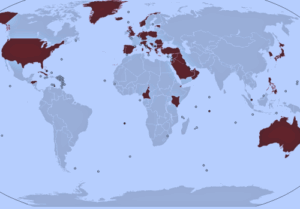Podcast: Play in new window | Download
A Constitutional Crisis In The United States
America is in the midst of a constitutional crisis. More than 200 lawsuits have been filed against the Trump administration during his first 100 days in office, resulting in more than 100 injunctions and stays, as he lays waste to fundamental constitutional protections and laws passed by Congress.
On the first day of his second term, Donald Trump had the audacity to sign an executive order claiming he was “restoring freedom of speech.” Instead, his administration is systematically destroying the right to speak freely, to write freely, to dissent freely, and to protest freely.
Trump ordered the elimination of “diversity, equity, and inclusion” (DEI) policies in both the public and private sectors and targeted several leading American universities, threatening to withhold federal funding for indoctrinating students with “woke” ideology, and for failing to combat antisemitism, by which he means criticism of Israel. He shut down the Voice of America and the Smithsonian Museum. He canceled the security clearances, government contracts, and access to federal buildings of several prominent law firms because he didn’t like the clients they represented. He even excluded the Associated Press from the White House because it refused to call the Gulf of Mexico, the Gulf of America.
In one of the most egregious violations of the First Amendment, the Trump administration canceled foreign student visas and deported legal permanent residents, claiming their campus protests were contrary to U.S. foreign policy interests.
Guest – Dahlia Taha, is a Policy Manager at the Muslim Public Affairs Council, where she leads the First Amendment and Civil Liberties work. Dahlia is a Palestinian-American Muslim. Prior to joining the MPAC team, she served as a Project Manager at The Texas A&M Foundation, where she researched and analyzed maternal health policy. At MPAC, Dahlia works to champion policies and initiatives that uplift and advocate for the Muslim Community nationwide, with a particular focus on protecting the First Amendment, academic institutions, and the next generation of American Muslims.
I am particularly pleased to have Dahlia with us today, because she and I are about to launch a podcast called Rapid Response, sponsored by MPAC, in which we will examine the struggle of students and community members – Muslims, Jews, and allies -, who have been targeted by the Trump administration for expressing political views in favor of Palestinian rights and sovereignty which the government is seeking to suppress.
—-
Base Nation: How U.S. Military Bases Abroad Harm America and the World
One of the most consequential pillars of U.S. military power is also one of its most overlooked: our vast network of overseas military bases. In his meticulously researched book Base Nation: How U.S. Military Bases Abroad Harm America and the World, author and anthropologist David Vine reveals how more than 800 U.S. military installations scattered across foreign lands are not merely symbols of strength—they’re often sources of harm. From the Pacific islands to the Middle East and Europe, these bases have become fixtures of American empire. However, they rarely receive the scrutiny they deserve from policymakers or the public.
Vine documents how this sprawling base network fuels geopolitical tension, fosters anti-American resentment, and props up authoritarian regimes. He shows how bases displace local populations, pollute ecosystems, and even affect the mental health and family lives of U.S. troops stationed abroad. And while Pentagon officials downplay the cost, Vine’s analysis reveals that maintaining these foreign outposts drains nearly $100 billion each year from U.S. taxpayers—money that could instead fund urgent domestic priorities.
Perhaps most troubling is how these bases have enabled decades of interventionist wars, making it easier for the U.S. to engage militarily across the globe without addressing root causes of conflict or engaging in genuine diplomacy.Our guest will discuss what a post-base foreign policy might look like, who benefits from the current system, and what’s behind the emerging bipartisan calls to rein it in
Guest – David Vine is a writer and political anthropologist. David was a professor of anthropology at American University for 18 years (2006-2024), He is also the author of Island of Shame: The Secret History of the US Military Base on Diego Garcia.
———————




